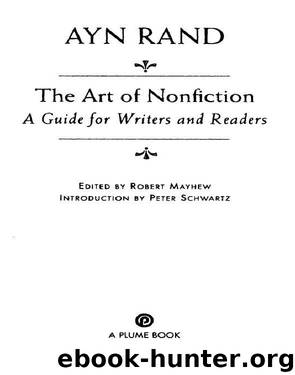The Art of Nonfiction by Ayn Rand

Author:Ayn Rand
Language: eng
Format: epub, mobi
Publisher: Penguin USA, Inc.
8
Style
Style is a distinctive, characteristic mode of execution. This definition applies to nonfiction writing as well as to all other creative activities, and it encompasses everything pertaining strictly to the form in which ideas are presented.
Style cannot be done to order. This is an absolute. If, when beginning a sentence, you ask whether it is colorful, you will not finish it. Or you will produce one artificial sentence after two hours of work. Style is the result of subconscious integration. You can know in principle how to bring about stylistic trimmings, but you cannot make them to order. Style, therefore, should not be pursued consciously; so many elements are involved that no mind could attend to and integrate all of them. It must be left to your subconscious.
Style in this respect is somewhat similar to emotions. You cannot order yourself to feel (or not feel) an emotion. You cannot control your emotions directly. You can, however, control them indirectly by identifying their root. Emotions are not primaries; they have subconscious intellectual causes. The same is true of style, which comes from a value-integration and must occur spontaneously.
But your subconscious must be free enough to generate style. When writing, if you try to attend simultaneously to your outline, to the content of what you are saying, and to saying it elegantly, your subconscious will be unable to handle it all at once. When what you want to say is clear, however, then spontaneously you will find a way of saying it with a twist. So do not force yourself.
Colorful writing is important. It makes your thought clearer and more dramatic, and therefore has both an intellectual and emotional appeal to the reader. But there is nothing worse than forced colorful writing, e.g., stretched metaphors that do not quite fit the content. The result of forced color is that the reader will mistrust your content, even if you are otherwise logical and honest. Every reader can sense this. He may not be able to tell you why, but he will know something is phony.
The reason why a mannered, artificial style leads to phoniness is implicit in the definition of style. Style is a distinctive, characteristic mode of execution. Characteristic of whom? Obviously, of the writer, or else it is not an individual style. And distinct from what? Obviously, from that of others. But you cannot, by conscious calculation, write in an individual way that is different from that of everybody else.
A fact has been observed in literary circles which nobody can explain (but then these people explain so little): namely, that occasionally a writer appears who has no training, yet writes brilliantly. In the twenties there was a truck driver, with a commensurate type of education, who wrote quite well. I was not fond of what he wrote, but he was successful. What was good about his writing was that it was completely natural. He wrote the way thoughts came to him. That created an inner conviction in his manner of writing. It sounded authentic and original, because he obviously knew no literary rules.
Download
This site does not store any files on its server. We only index and link to content provided by other sites. Please contact the content providers to delete copyright contents if any and email us, we'll remove relevant links or contents immediately.
| Books & Reading | Comparative Literature |
| Criticism & Theory | Genres & Styles |
| Movements & Periods | Reference |
| Regional & Cultural | Women Authors |
4 3 2 1: A Novel by Paul Auster(12392)
The handmaid's tale by Margaret Atwood(7763)
Giovanni's Room by James Baldwin(7346)
Asking the Right Questions: A Guide to Critical Thinking by M. Neil Browne & Stuart M. Keeley(5775)
Big Magic: Creative Living Beyond Fear by Elizabeth Gilbert(5771)
Ego Is the Enemy by Ryan Holiday(5448)
The Body: A Guide for Occupants by Bill Bryson(5096)
On Writing A Memoir of the Craft by Stephen King(4944)
Ken Follett - World without end by Ken Follett(4732)
Adulting by Kelly Williams Brown(4574)
Bluets by Maggie Nelson(4556)
Eat That Frog! by Brian Tracy(4540)
Guilty Pleasures by Laurell K Hamilton(4449)
The Poetry of Pablo Neruda by Pablo Neruda(4108)
Alive: The Story of the Andes Survivors by Piers Paul Read(4033)
White Noise - A Novel by Don DeLillo(4010)
Fingerprints of the Gods by Graham Hancock(4004)
The Book of Joy by Dalai Lama(3986)
The Bookshop by Penelope Fitzgerald(3853)
